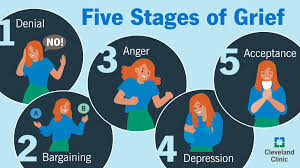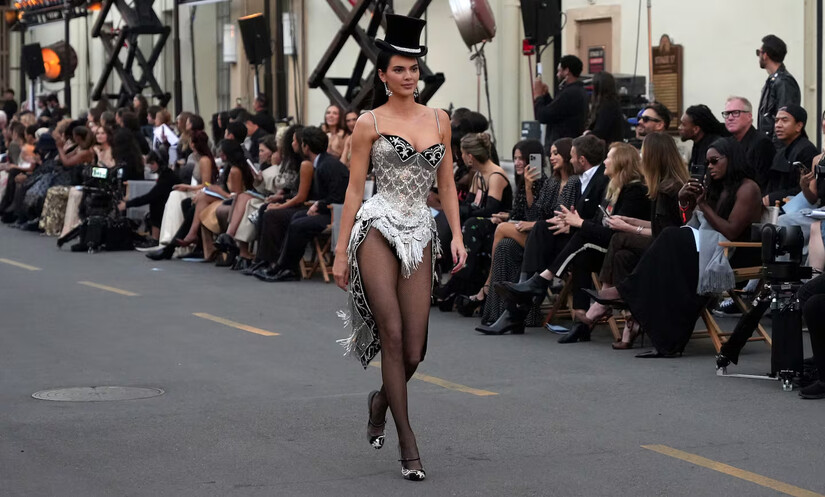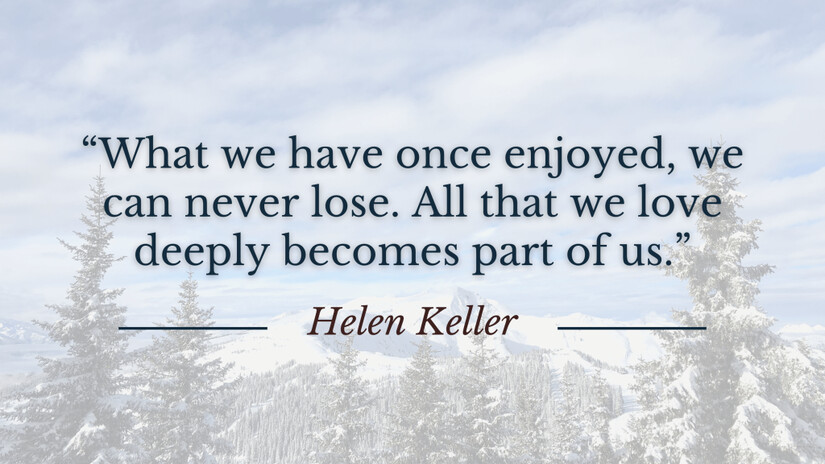Image

SKYLARK'S ARTICLE OF THE WEEK - GOOD GRIEF
Good grief. I've written about grief before, but it never feels good. I thought it was an appropriate time to revisit this topic. We're at the age where a lot of us are experiencing loss or dealing with grief that just won't let up. That's a more serious kind of grief called Profound Grief. I'll explore that, too.
The most widely known model of grief, established by Elisabeth Kubler-Ross, outlines five stages: Denial and isolation, bargaining, anger, depression, and acceptance. These stages are not a linear process and people may experience them in a different order or revisit them at various times. Other models include additional stages, and it is important to remember that grief is a personal journey and can be a long and difficult process. The five stages of grief are:

Denial
Denial is the initial phase of grief, acting as a defense mechanism that buffers the shock of a loss. During this stage, individuals may refuse to accept the reality of the death, avoid conversations about it, or experience a sense of numbness. It's a temporary state that helps the person cope with overwhelming emotions before they move on to other stages of grief.
Bargaining
The bargaining process sometimes happens before your loss has fully occurred, like when you think, “If I recover from cancer, I promise I’ll start going to church,” or “If my husband survives his heart attack, I’ll never argue with him again.”
But it can take place afterward, too, in the form of “if only” thinking:
This may not look like bargaining, but the thinking is similar. We engage in a type of mental gymnastics to try to undo something that can’t be undone. This can lead to feeling worse.
Anger
Anger is a perfectly natural response, and in the case of loss, it can be directed at a variety of sources. It can also manifest as blame — the feeling that someone is at fault for your loss.
Your anger could also be less targeted, creeping up at random moments. Sometimes, you’re just angry at innocent bystanders, like the guy in the checkout line at the grocery store who looked at you funny. It’s not always rational.
Depression
Symptoms of the depression stage of grief can include:
Grief can cause physical symptoms, too, like aches and pains, changes in sleep patterns and increased inflammation in your body, which can worsen existing health issues and lead to new ones.
This stage of grief isn’t the same as major depressive disorder, a mental health condition that’s a combination of emotional, cognitive and physical symptoms. But grief can turn into clinical depression, so it’s important to address it as you’re experiencing it.
Acceptance
The pain of your grief may never fully fade. But acceptance means learning to live with the loss — acknowledging this new reality and allowing sorrow and joy to live alongside one another.
In the acceptance stage, you’re no longer immobilized by sadness. For example, you can hear a song on the radio that reminds you of your loved one without bursting into tears.
“Acceptance is a sense of understanding that there is a finality to what has happened,” Dr. Josell says. “You can hold onto your sadness while still experiencing good memories of the past and maintaining hope for the future.”
OTHER GRIEF PHASES
You might hear about other grief phases, too. Some people refer to seven stages of grief, incorporating additions like:
Some lists of the stages of grief may include others, as well, like guilt, processing, reconstructing — which are all valid feelings and experiences that may occur on your grieving journey.
DO THESE STAGES ALWAYS HAPPEN IN ORDER?
These stages are meant to be descriptive, not prescriptive. This means they won’t necessarily apply to everyone or happen in the order presented. It’s common to weave in and out of stages and experience elements of them at the same time.
“Some people don’t go through all the stages,” Dr. Josell says, “and it’s not always nice and sequential. You may move in and out of different stages.”
HOW LONG DOES GRIEF LAST?
There’s no set timeline for grief, and anyone who tells you to “move on” or “get over it” is underestimating and misunderstanding the weight of loss.
That said, the length of your grieving process depends on what kind of grief you’re experiencing.
Let's take a deeper dive into profound grief. This is an intense and deep emotional reaction to a significant loss, characterized by overwhelming sadness, sorrow, and pain. It is a profound sense of loss that can be a natural part of bereavement, but can also become prolonged or "complicated" if it is debilitating and persistent. Characteristics of profound grief are:
While profound grief is a normal response to loss, it can become a psychiatric diagnosis called Prolonged Grief Disorder when the symptoms are persistent and incapacitating. To be diagnosed, the loss must have occurred at least six months to a year ago, and the person must experience strong yearning for the deceased and several other symptoms, such as intense emotional pain, a sense of meaninglessness, or avoidance of reminders. It might be a good time to seek professional help through a grief counselor. Ask your doctor or a good friend who may know of someone. Don't put it off. You deserve to be happy, not sad.
Peace and Love,
Skylark
By the time we reach 60 and beyond, we've lost a lot of people we love. Some of the loss is a natural progression of life while other loss can be sudden and devastating. No matter what loss you are experiencing, if you are grieving to the point that it is affecting your daily life, don't be afraid to seek help. It could save you.

SKYLARK'S PICKS OF THE WEEK - EMPOWERED AUTUMN FESTIVAL


SKYLARK'S HIGHLIGHT OF THE WEEK - VOGUE WORLD: HOLLYWOOD 2025
The Vogue World: Hollywood 2025 fashion show was held this past Sunday, October 26, 2025, at Paramount Studios in Los Angeles and celebrated the fusion of film and fashion. Happy Halloween!










SKYLARK'S INSPIRATIONAL QUOTE OF THE WEEK

SKYLARK'S PRAYER OF THE WEEK
Dear God,
Please protect us as we navigate the pathways of grief for our loved ones with your love and grace. Amen.

SKYLARK'S ITALIAN PHRASE OF THE WEEK
English: Guide us through our grief.
Italian: Guidaci attraverso il nostro dolore.

SKYLARK'S QUESTIONS OF THE WEEK
How do you handle grief?
Please put your answer in the Comment section of my post. I'd love to hear from you.

SKYLARK'S INTERIOR DECORATING TIP OF THE WEEK
Lighting can create a mood of calm and serenity. Lanterns are a great addition to create a cozy mood in any room in your home.

SKYLARK'S SONG OF THE WEEK - DOJA CAT - GORGEOUS
LYRICS
If they wasn't grillin' before
They gon' be really mad when we hit the floor
It's a crime to be gorgeous
Between you and a million phones
They takin' pictures like we hittin' a pose
It's alright to be honest
Even when we sit in the dark
I feel the prettiest that you ever saw
Are your eyes even open?
It ain't ever really our fault
We make a killing being so beautiful
It's a crime to be gorgeousIt's a crime to be gorgeous
It's a crime to be gorgeous
It's a crime to be gorgeous
La-la-la, la-la-la, la-la-la, la-la-la
It's a crimeBabe, I just called to tell you how much I love you
And how amazingly beautiful that you are
Oh my God, how uplifting and inspiring you've been to me
For all this time
And I love you (look at me), and
No one even has fine hair or is smarter (look at me)Yeah, look at me, really look at me
Loaded the magazine, they throwin' the book at me
I'm bookin' it 80 miles per hour 'cause my jewelry
I'm cookin' some collard greens, I ain't got no room for these
Then I got surgery 'cause of scrutiny
But he like my before and after pictures, he cool wit' theseI took off the wig and put some mousse on my new 4C
I put on the wig and take it off as I damn well please
I look like my family, I don't need to brag
Titty used to sag, least she got some ass
Can't avoid the pap, can't even avoid the cash
Yeah, you beautiful, baby, but you got more than thatPretty hurts, don't talk to me 'bout Brazilians
After that wax, you thought you wanted to kill him
But now you walkin' 'round like you one in a million
He lookin' at me like he want some beautiful childrenIf they wasn't grillin' before
They gon' be really mad when we hit the floor
It's a crime to be gorgeous
Between you and a million phones
They takin' pictures like we hittin' a pose
It's alright to be honest
Even when we sit in the dark
I feel the prettiest that you ever saw
Are your eyes even open?
It ain't ever really our fault
We make a killing being so beautiful
It's a crime to be gorgeousit's a crime to be gorgeous
(It's all we need, it's all we want) it's a crime to be gorgeous
(It's all we need, it's all we want) it's a crime to be gorgeous
(It's all we need, it's all we want) it's a crimeShe like white gold in her hardware with an install and a long nail
With a eyelash and it's glued on, she ain't so Christian in Louboutins
And now she got contacts but no close friends
And she lasered all that hair off
And she thank God for that Emsculpt
She wanna be chic when it's inspired by heroinAh, there you go with that smile again
She stay in school but she more privy to collagen
Aw, now you on Botched again
You oughta cut off all them Khias, they toxic, friend, ah
You gettin' showered in compliments, huh (I do)
You feel empowered but not within
I mean, I only got myself to appeal to (I do)
They got they nose up judging me, but ain't all of 'em real
So if they wasn't grillingIf they wasn't grillin' before
They gon' be really mad when we hit the floor
It's a crime to be gorgeous (yeah)
Between you and a million phones
They takin' pictures like we hittin' a pose (yeah, yeah, yeah)
It's alright to be honest (hands up)
Even when we sit in the dark
I feel the prettiest that you ever saw
Are your eyes even open? (Come on)
It ain't ever really our fault
We make a killing being so beautiful
It's a crime to be gorgeous (yeah)it's a crime to be gorgeous
(It's all we need, it's all we want) it's a crime to be gorgeous
(It's all we need, it's all we want) it's a crime to be gorgeous
(It's all we need, it's all we want) it's a crime to be gorgeous


ABOUT MY BRAND, SKYLARK LIVE
My brand, Skylark Live, began when I turned 60 and noticed a profound shift. I wanted to talk about it and share what I was experiencing with the hope of helping other women as well. My brand consists of a weekly newsletter and a monthly vlog designed to motivate and inspire women over 60 to thrive in mature aging through knowledge and self-awareness. Andiamo! Let's go!
Weekly Newsletter - My weekly newsletter, 60 and Beyond with Skylark, features articles about human interest, nature, general observations, inspiration, motivation, music, places I've been to, and ideas I want to explore. I represent Bay Shore and towns beyond. There is also a calendar of events. I throw in Italian words, too, because I love the language and all things Italian. Bella Italia! As a paying subscriber, you will receive my newsletter each Wednesday morning in your email. That gives you a head's up. You can also advertise your business or event on my newsletter. Just click this link to subscribe: For updates, subscribe to our free newsletter!
Monthly Vlog - My first Monday-of-the month vlog, 60 and Beyond with Skylark, is a recap of what I've written about in my newsletters throughout the previous month. Then I introduce a new topic. My vlog is live on my YouTube channel, Skylark Live, and you can view it at any time. Just click the link to subscribe: (736) Skylark Live - YouTube
HOW TO SUPPORT ME
Patreon - This is where you can financially support my brand. It enables me to write my newsletters and create my vlogs to share with you. Just click the link to contribute: www.patreon.com/SkylarkLive
Social Media - Follow me on Facebook, X, Instagram, and LinkedIn under my brand, Skylark Live.
Thank you for your love and support. Apprezza la giornata. Cherish the day. Saluti!
